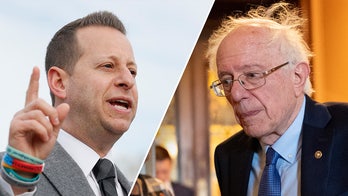The release of 10,000 pages of Clinton White House papers only reinforces how his eight years in office were defined not by "the economy, stupid" or welfare legislation -- but Monica Lewinsky.
Among the revelations was a mea culpa to the White House from then-MSNBC anchor Keith Olbermann, who apologized to the president for his network's coverage obsession with the Lewinsky scandal.
The documents, released Friday by the National Archives, detail the scramble inside the White House after the scandal over the president's affair broke.
The papers include lists of talking points, questions prepared for media interviews and efforts to steer the president through impeachment.
The Olbermann apology was addressed in an October 1998 email exchange among White House aides. One wrote: "Keith Olbermann has written to POTUS apologizing for 'whatever part I may have played in perpetuating this ceaseless coverage (of the Lewinsky story). .... I'll be heading back to my previous career in sports as quickly as possible....'"
Below the excerpt of Olbermann's letter to President Clinton is a proposed response.
It says: "Dear Keith: Thanks so much for your kind message. I've been touched by the many expressions of encouragement and support I have received from friends across the country. I'm grateful you got in touch with me, and I send you my very best wishes. Sincerely, POTUS."
It apparently was the "generic" response from the White House for letters of support. Another aide suggested making the response "a bit warmer."
Ultimately, Olbermann did leave MSNBC for a sports coverage job, though he reportedly downplayed the Lewinsky link at the time. (He later returned to MSNBC, before leaving again.)
Unlike previous batches of documents released earlier this year, the 10,000 pages of records out Friday cover some of the darker days of the Clinton administration.
They touch on the Whitewater investigation into Bill and Hillary Clinton's land dealings in Arkansas; Bill Clinton's affair with White House intern Lewinsky; the 1993 death of deputy White House counsel Vince Foster; and the pardons Bill Clinton granted in his final hours as president.
Many records involving Lewinsky are redacted, but one document sheds light on her job: Lewinsky sent an official request to hang a picture of Clinton, signing a telecommunications bill, in a White House legislative affairs office.
Behind the scenes, Clinton officials were adamant that they were not trying to discredit Lewinsky.
"There is no evidence whatsoever that the White House was directing or involved in any campaign against her," Clinton aide Sidney Blumenthal wrote in a January 1999 memo.
The papers show that the Republican-led investigation into Foster's suicide infuriated the White House, which tried to recruit bestselling author William Styron to write a piece critical of the probe. Clinton communications specialists even drafted a piece for the novelist and author of a memoir of his own depression. It is unclear if the piece was ever published.
Other documents showed then-first lady Hillary Clinton voicing growing dissatisfaction with the caliber and competence of the defense that was being mounted in her behalf over the Whitewater scandal.
Several pages of unsigned handwritten notes from a White House meeting in March 1994 record a number of acerbic comments from her as her aides, along with those to President Clinton, scrambled to defuse allegations of improper business dealings by the couple when they lived in the governor's mansion in Arkansas.
"We've been so incompetent," Mrs. Clinton complained at one point, the notes show. She complained of "yet another meeting that goes nowhere, another useless conversation." Of White House counsel Bruce Lindsey, Mrs. Clinton complained that his "weakness" was that he "doesn't tell you what he doesn't know." Mrs. Clinton also complained about the absence from a critical briefing of then-White House advisor George Stephanopoulos, adding: "Make George go to briefings."
Mrs. Clinton complained that the team had "no strategy to deploy resources" and asked pointedly: "Why is it we don't get it done?"
President Clinton, too, expressed dissatisfaction with the Whitewater PR operation, the notes show. A "gripe by POTUS" appears to refer to the bureaucracy of the scheduling operation, which the president wanted to use to hold more one-on-one meetings with lawmakers. When she concluded that her own schedule did not include enough "prep time," Mrs. Clinton ordered her aides: "Get the time on the schedule now."
The records are being released as Hillary Clinton ponders a bid for the White House in 2016.
With these documents the National Archives will have released about 30,000 pages of papers since February. Both the Obama White House and the Clinton Presidential Library in Little Rock, Arkansas, have signed off on the release of the records.
Past installments have offered an unvarnished look at Bill Clinton's two terms, detailing his unsuccessful attempt to change the health care system, Republicans' sweeping victories in the 1994 midterm elections and the shaping of his wife's public image.
Hillary Clinton, who went on to serve as a senator from New York and as President Obama's secretary of state, now is a powerful advocate for Democrats in the midterm elections and the leading Democratic prospect for president in 2016. The possibility of a presidential campaign has heightened interest in the documents by media organizations, political opposition researchers and historians.
In addition to the 1990s-era events, the papers touch on Elena Kagan, now a Supreme Court justice, who as a White House counsel defended Bill Clinton in the lawsuit brought by ex-Arkansas state employee Paula Jones. In one May 1996 memo, Kagan said she and others were concerned it looked "unseemly" for the president to be represented by so many lawyers on the case -- and so some of their names were removed from a cover page on a document.
Clinton's testimony for the Jones lawsuit, in which he denied a sexual relationship with Lewinsky, led to his impeachment in 1998. The House approved two articles of impeachment against Clinton, but he was acquitted by the Senate.
The memos were previously withheld by the National Archives because they were exempt from disclosure under restrictions related to appointments to federal office and confidential advice received by the president from his advisers. Under the law, presidential records can be withheld from the public for 12 years after the end of an administration if they fall under certain restricted categories.
Fox News' James Rosen and The Associated Press contributed to this report.




